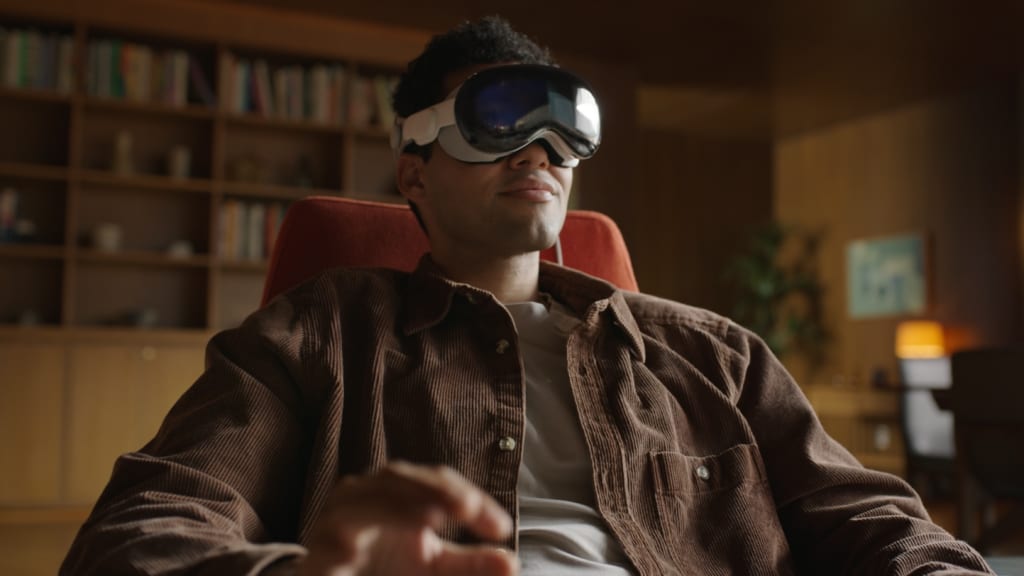A Lated But Lasted Reality Awaits
- The Dawn of the VR Age after Apple Vision Pro

Apple has officially released its VR product, the Vision Pro. In typical Apple fashion, it is heralding a revolution that will innovate our known reality. Their ambitious push to make virtual reality glasses mainstream is opening the door to promoting virtual reality. As more consumers adapt to the immersive virtual world, the boundary between physical and digital will begin to blur.
Apple has long set the standard for user-friendly technology. Its emphasis on simplicity, integration, and design will make virtual reality technology more convenient and attractive. Apple's powerful mobile processor may have a dedicated virtual reality chip and high-resolution display, providing a stunning virtual reality experience. Immersive virtual reality games, productivity tools, and experiences previously only used by tech enthusiasts may redefine ordinary consumers.
However, new problems arise - what will we do in these virtual worlds? Virtual reality implies isolating us from the physical world through reliance on stimuli and senses. Constant immersion may increase social isolation, weaken connections with friends, family, and community. Psychological research indicates that overuse of virtual reality may lead to problems such as depression, insomnia, and loss of reality perception.
Virtual reality content seems destined to become more persuasive, intimate, and invasive. Virtual reality advertising may use subliminal messages to hijack our will, hijack the visual and auditory centers of the brain. Virtual reality and interpersonal relationships may commodify and gamify human intimacy. Virtual reality entertainment may turn passive consumption into compulsive distraction, sacrificing real-world connections for immersive simulation.
If there is a lack of careful management and ethical categories, virtual reality will open the door to massive manipulation and control, unprecedented. Information collection in the virtual reality ecosystem provides technology companies with the power to shape public cognition and beliefs. Once a large user base is formed, regulating content and advertising in virtual reality will become extremely difficult. Even the virtual reality system itself may become a data tool that collects the ability to identify and influence our inner psychological state.
At its core, virtual reality offers a costly trade-off: providing virtual wonders and joy to reduce participation in real life. We must ask whether freedom means escaping the physical world, whether meaning arises from direct experience, human connections, and active participation. Virtual reality as a joyous time may distract our energy to deal with the world's most pressing challenges - climate change, social injustice, political divisions - while avoiding accountability for lack of positive action.
Apple's entry into virtual reality means accelerating towards a future for which we are inadequately prepared. The manufacture of a large number of illusions threatens to cover up the truth - using simulation to replace social connections, delegating meaningful actions to the physical world. Before we indulge in fantasy, we must address that our highest ideals are not in virtual wonderland but in building a just, compassionate, and sustainable reality.
The choice is approaching quickly: do we accept the infinite virtual horizon of virtual reality, or do we root ourselves in a reason that serves higher than any simulation? The answer we find may determine whether reality is still shaped by us - or falls into the hands of algorithms that will redesign it according to its own image.
Apple has officially released its VR product, the Vision Pro. In typical Apple fashion, it is heralding a revolution that will innovate our known reality. Their ambitious push to make virtual reality glasses mainstream is opening the door to promoting virtual reality. As more consumers adapt to the immersive virtual world, the boundary between physical and digital will begin to blur.
Apple has long set the standard for user-friendly technology. Its emphasis on simplicity, integration, and design will make virtual reality technology more convenient and attractive. Apple's powerful mobile processor may have a dedicated virtual reality chip and high-resolution display, providing a stunning virtual reality experience. Immersive virtual reality games, productivity tools, and experiences previously only used by tech enthusiasts may redefine ordinary consumers.
However, new problems arise - what will we do in these virtual worlds? Virtual reality implies isolating us from the physical world through reliance on stimuli and senses. Constant immersion may increase social isolation, weaken connections with friends, family, and community. Psychological research indicates that overuse of virtual reality may lead to problems such as depression, insomnia, and loss of reality perception.
Virtual reality content seems destined to become more persuasive, intimate, and invasive. Virtual reality advertising may use subliminal messages to hijack our will, hijack the visual and auditory centers of the brain. Virtual reality and interpersonal relationships may commodify and gamify human intimacy. Virtual reality entertainment may turn passive consumption into compulsive distraction, sacrificing real-world connections for immersive simulation.
If there is a lack of careful management and ethical categories, virtual reality will open the door to massive manipulation and control, unprecedented. Information collection in the virtual reality ecosystem provides technology companies with the power to shape public cognition and beliefs. Once a large user base is formed, regulating content and advertising in virtual reality will become extremely difficult. Even the virtual reality system itself may become a data tool that collects the ability to identify and influence our inner psychological state.
At its core, virtual reality offers a costly trade-off: providing virtual wonders and joy to reduce participation in real life. We must ask whether freedom means escaping the physical world, whether meaning arises from direct experience, human connections, and active participation. Virtual reality as a joyous time may distract our energy to deal with the world's most pressing challenges - climate change, social injustice, political divisions - while avoiding accountability for lack of positive action.
Apple's entry into virtual reality means accelerating towards a future for which we are inadequately prepared. The manufacture of a large number of illusions threatens to cover up the truth - using simulation to replace social connections, delegating meaningful actions to the physical world. Before we indulge in fantasy, we must address that our highest ideals are not in virtual wonderland but in building a just, compassionate, and sustainable reality.
The choice is approaching quickly: do we accept the infinite virtual horizon of virtual reality, or do we root ourselves in a reason that serves higher than any simulation? The answer we find may determine whether reality is still shaped by us - or falls into the hands of algorithms that will redesign it according to its own image.





Comments
There are no comments for this story
Be the first to respond and start the conversation.